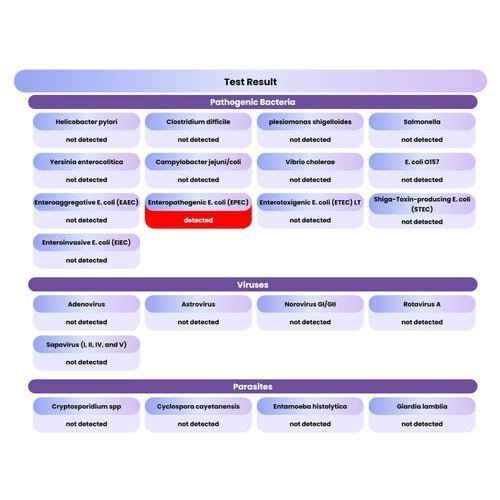
Medically reviewed by Kate Hilton RD
In May 2024
A recent study has given valuable insights into the complicated relationship between the gut microbiome and IBS, suggesting that gut dysbiosis, an imbalance of bacteria within the gut, may influence the development of IBS.
IBS is one of the most common gastrointestinal disorders affecting a significant amount of the population globally. It is typically accompanied by a variety of symptoms including bloating, diarrhoea, constipation, and stomach pain, identifying your symptoms and their frequency are key to diagnosing the condition.
The gut microbiome has emerged as a particular area of interest for our overall health, now; recent studies have looked at the link between our gut bacteria and how it impacts symptoms caused by IBS.
What does the research say?
A study was conducted to identify if the types, quantity, and diversity of bacteria within the gut is different for people with IBS compared to people who do not have the condition. Data was taken from many previous studies and analysed stool samples from 567 people with IBS and 487 people without it.
Key Findings
Diversity of Bacteria:
- When looking at the gut bacterial diversity of only IBS sufferers, no big differences were identified.
- However, when comparing the results of IBS sufferers to those without the condition, researchers found that people with IBS generally have less diversity in their gut bacteria compared to those without IBS.
Types of Bacteria:
- Different types of gut bacteria were found in people with IBS compared to those without it.
- Specifically, certain bacteria were found in differing amounts in those with diarrhoea-dominant IBS compared to those without diarrhoea. Suggesting that certain bacteria can cause specific IBS related symptoms.
What This Means
- Gut dysbiosis (imbalance): The study suggests that an imbalance in gut bacteria, known as gut dysbiosis is linked to IBS. The imbalance differs between IBS types which may affect which symptoms it presents.
- Unclear Cause and Effect: It’s not yet clear if the changes in gut bacteria cause IBS or happen because of it.
- Further Research Needed: More studies are needed to find out if targeting these bacterial imbalances through diet or medication could help manage IBS symptoms.
Link to the clinical study - https://journals.asm.org/doi/10.1128/spectrum.02125-22
What type of gut bacteria can cause IBS?
A certain type of bacteria is unlikely to be solely responsible for causing your IBS. However an imbalance of gut bacteria which can mean a lack of different types of bacteria or an overgrowth of specific bacteria types are commonly observed in IBS patients.
Specific bacteria that produces butyrate (a short chain fatty acid) such as Roseburia-Eubacterium rectale which helps to maintain gut health was lower in people with constipation dominant IBS and higher in people with diarrhoea dominant IBS.
Other examples of bacteria that have been linked to IBS symptoms include an overabundance of bacteria such as firmicutes and a decrease in Bacteroidetes, particularly in diarrhoea dominant IBS.
Whilst certain bacteria have been linked to causing a variety of IBS symptoms, it is important to understand the overall health and diversity of the gut to identify gut dysbiosis, which as the research suggests, can be linked to IBS.
Can a gut imbalance cause IBS?
Whilst it is not accurate to say that a gut imbalance directly causes IBS as there are many different factors that collectively contribute, there is research to suggest that it can significantly contribute to the development and severity of IBS.
Dysbiosis can lead to leaky gut, immune system reactions, and altered gut motility, all of which can trigger or heighten IBS symptoms and other autoimmune diseases. The exact way in which the gut microbiome can influence IBS symptoms is not fully understood, however targeting the gut microbiome as a treatment method for IBS is an area of interest and growing research.
Gut dysbiosis can significantly increase your risk of developing several chronic conditions, autoimmune diseases and many gastrointestinal disorders, the earlier it is identified and addressed, the easier it will be to treat.
To get the complete picture of your gut microbiome and to identify gut dysbiosis, a gut microbiome health test which measures the different types of gut bacteria we have in our gut is recommended.
Will improving my gut microbiome help with IBS?
Yes, our own clinical research shows that improving your gut health can significantly improve your IBS symptoms. By following a personalised diet plan designed to improve gut health, 78% of people saw their symptoms improve from severe to moderate. Participants also experienced an increase in beneficial gut bacteria after following the personalised diet plan for 6 weeks.
Can good gut bacteria cure IBS?
There is currently no cure for IBS, it is a chronic condition that requires long term management. However, adopting lifestyle and dietary changes can significantly alleviate your symptoms and improve your quality of life. Establishing a healthy gut microbiome can help to improve your overall health and reduce many gastrointestinal symptoms that can arise due to improper gut health.
How Can I Improve My Gut Bacteria to Help IBS?
Here are 5 easy steps to improve your gut health.
- Diet: Gut friendly foods should be adopted into your diet alongside a healthy balanced diet. Gut friendly foods can significantly boost the numbers of healthy gut bacteria.
- Add more fibre into your diet: Fibre is essential for digestive health. It helps to regulate bowel movements and is crucial in managing the many symptoms of IBS
- Reduce Antibiotics: Use antibiotics only when necessary as they can destroy healthy gut bacteria and disrupt the overall balance of the gut.
- Stress Management: Particularly in IBS patients, stress has been proven to trigger symptoms, it can also negatively impact our gut health. Techniques such as yoga, meditation, and regular exercise can help manage stress effectively.
- Adequate sleep: Try and aim for 8 hours of sleep per night and ensure that it is scheduled into your day. Sleep and gut health work hand in hand with both influencing each other, sleep can improve your gut health, and likewise, a healthy gut can improve your sleep.
Further reading - How to improve your gut health



